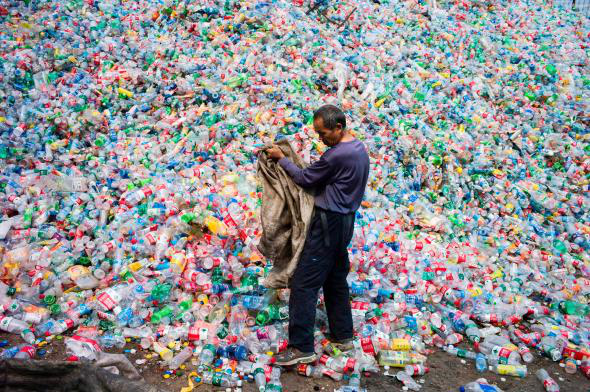Billions of tons of plastic have been made over the past decades, and much of it is becoming trash and litter, finds the first analysis of the issue. Mass production of plastics, which began just six decades ago, has accelerated so rapidly that it has created 8.3 billion metric tons—most of it in disposable products that end up as trash. If that seems like an incomprehensible quantity, it is.
Plastic takes more than 400 years to degrade, so most of it still exists in some form. Only 12 percent has been incinerated. The study was launched two years ago as scientists tried to get a handle on the gargantuan amount of plastic that ends up in the seas and the harm it is causing to birds, marine animals, and fish. The prediction that by mid-century, the oceans will contain more plastic waste than fish, ton for ton, has become one of the most-quoted statistics and a rallying cry to do something about it.

You can’t manage what you don’t measure
The new study reveals that the first global analysis of all plastics ever made—and their fate. Of the 8.3 billion metric tons that have been produced, 6.3 billion metric tons has become plastic waste. Of that, only nine percent has been recycled. The vast majority—79 percent—is accumulating in landfills or sloughing off in the natural environment as litter. Meaning: at some point, much of it ends up in the oceans, the final sink.
If present trends continue, by 2050, there will be 12 billion metric tons of plastic in landfills. That amount is 35,000 times as heavy as the Empire State Building. Half the resins and fibers used in plastics were produced in the last 13 years, the study found. China alone accounts for 28 percent of global resin and 68 percent of polyester polyamide and acrylic fibers. Much of the growth in plastic production has been the increased use of plastic packaging, which accounts for more than 40 percent of non-fiber plastic.
Join our 6th International Conference on Recycling and Waste Management which will be held during December 3-5, 2018 at Dubai, U.A.E.
For more details, visit: https://goo.gl/gDtVYT
Plastic takes more than 400 years to degrade, so most of it still exists in some form. Only 12 percent has been incinerated. The study was launched two years ago as scientists tried to get a handle on the gargantuan amount of plastic that ends up in the seas and the harm it is causing to birds, marine animals, and fish. The prediction that by mid-century, the oceans will contain more plastic waste than fish, ton for ton, has become one of the most-quoted statistics and a rallying cry to do something about it.

You can’t manage what you don’t measure
The new study reveals that the first global analysis of all plastics ever made—and their fate. Of the 8.3 billion metric tons that have been produced, 6.3 billion metric tons has become plastic waste. Of that, only nine percent has been recycled. The vast majority—79 percent—is accumulating in landfills or sloughing off in the natural environment as litter. Meaning: at some point, much of it ends up in the oceans, the final sink.
If present trends continue, by 2050, there will be 12 billion metric tons of plastic in landfills. That amount is 35,000 times as heavy as the Empire State Building. Half the resins and fibers used in plastics were produced in the last 13 years, the study found. China alone accounts for 28 percent of global resin and 68 percent of polyester polyamide and acrylic fibers. Much of the growth in plastic production has been the increased use of plastic packaging, which accounts for more than 40 percent of non-fiber plastic.
Join our 6th International Conference on Recycling and Waste Management which will be held during December 3-5, 2018 at Dubai, U.A.E.
For more details, visit: https://goo.gl/gDtVYT
Comments
Post a Comment